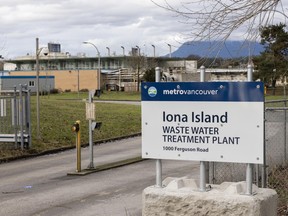“They’re (federal government) going to give us ($250 million), we’re going to forgo ($220 million), so it’s pretty much a wash.” — Anmore Mayor John McEwen, a member of the Metro Vancouver finance committee

Metro Vancouver is considering giving certain developers a break from its rising development cost charges worth up to $220 million so it doesn’t lose out on a promised $250 million for its Iona sewage plant replacement project.
Recommended Videos
The federal government set aside the $250 million in its fall economic update to be paid out of the $6 billion Canada Housing Infrastructure Fund that was established last April.
Now, the regional district’s finance committee, at its Feb. 13 meeting, will receive a staff report outlining a possible step that it can take to meet the terms for making an application to that fund, which would be a concession that would extend protection from rising the rising charges for developments already in the works.
That concession, however, rankles many of Metro’s board members who feel challenged to pay for needed new infrastructure with limited, and unpopular, ways to raise revenue to pay for it.
“Growth has to pay for growth,” said Anmore Mayor John McEwen, who is also vice-chairman of the Metro board that, in 2023, passed a stepped increase in the development charges that mean rates rise to $34,133 by Jan. 1, 2027 for a single residential lot from $10,027 in 2024.
McEwen said the federal government “didn’t seem happy” about the increases and put conditions in place to try to offset them.
They’re going to give us $250 million, we’re going to forgo $220 million, “so it’s pretty much a wash,” said McEwen, who is unlikely to vote in favour of making the concession now.
To McEwan, that would leave Metro’s budget short at the same time that the board is trying to contain its 2026 budget to a five-per-cent tax increase.
The federal $250 million would match a provincial share to what is expected to be a $10 billion plan for a “critical infrastructure project” that supports building new housing for population growth.
Terms of the Canada Housing Infrastructure Fund, however, lean on applicants to either freeze development charges, the fees municipalities levy to pay for the new water and sewer lines, roads and other infrastructure for new development, or put “alternative measures” in place that reduce the cost of building new homes.
Metro’s changes to this levies called for projects that had a completed rezoning, development or a building permit, with permit fees paid as of March 22, 2024 — the date the revised levy’s bylaw passed — to be charged the 2024 rates as long as building permits were completed by March 21, 2025.
The alternative measure Metro staff have suggested the board consider would be to extend the period for which projects already underway at the time new charges were approved be protected from the rising fees from 12 months to 24 months.
The staff report was submitted only as an information item, no action is expected, but its authors estimated that such ad extension could cost between $70 million and $220 million in forgone development charge increases.
A representative from the development community viewed the possibility of extending the protected period as “a helpful first step” but still argued Metro should pause its entire schedule of levy increases to work out a new formula for charging them.
“It’s an easy thing to say, but a hard thing to solve,” said Brad Jones, chief development officer for Wesgroup. “The scale of the problem (of paying for infrastructure) has outgrown the structure to solve the problem. And I think the feds need to play a far bigger role in investing in these major urban infrastructure projects than they have.”
However, Jones argued that municipalities need to reconsider their part in picking up more of the cost because the residents in new housing developments aren’t the only beneficiaries of new construction.
He added that new development has been able to “pay more than its fair share” for a long time, but that expectation has hit a breaking point. Municipalities have to consider shouldering more of the cost.
“I think this region has very low property taxes, when you compare to the rest of North America,” Jones said.
McEwen, however, as a local politician, said that is a hard sell for his constituents.
“There’s just no room,” McEwen said. “We’re already challenged right now with some of these big infrastructure projects.”
McEwen agrees with Jones, though, that the federal government should be spending more on municipal infrastructure.
“They’re the ones that are dictating the amount of immigration, they’re dictating the amount of housing needed to be built,” McEwen said. “Then they have to start coming up with ways of funding the infrastructure to facilitate that.”
Vancouver Coun. Mike Klassen, vice-chairman of the Metro finance committee, said it will be an uncomfortable trade-off but “at this point, I’m extremely eager to see that $250 million come from the federal government.”
Klassen said $220 million in lost revenue “is a huge amount of money” to try to find in its budget “but I fully understand that the organization is in the spotlight right now around its spending.”